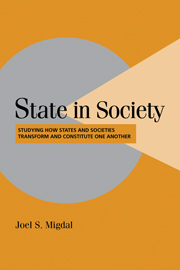Book contents
- Frontmatter
- Contents
- Acknowledgments
- Part I Introduction
- 1 THE STATE-IN-SOCIETY APPROACH: A NEW DEFINITION OF THE STATE AND TRANSCENDING THE NARROWLY CONSTRUCTED WORLD OF RIGOR
- Part II Rethinking Social and Political Change
- Part III A Process-Oriented Approach: Constituting States and Societies
- Part IV Linking Micro- and Macro-Level Change
- Part V Studying the State
- Bibliography
- Index
- Titles in the series
1 - THE STATE-IN-SOCIETY APPROACH: A NEW DEFINITION OF THE STATE AND TRANSCENDING THE NARROWLY CONSTRUCTED WORLD OF RIGOR
Published online by Cambridge University Press: 05 September 2012
- Frontmatter
- Contents
- Acknowledgments
- Part I Introduction
- 1 THE STATE-IN-SOCIETY APPROACH: A NEW DEFINITION OF THE STATE AND TRANSCENDING THE NARROWLY CONSTRUCTED WORLD OF RIGOR
- Part II Rethinking Social and Political Change
- Part III A Process-Oriented Approach: Constituting States and Societies
- Part IV Linking Micro- and Macro-Level Change
- Part V Studying the State
- Bibliography
- Index
- Titles in the series
Summary
This introductory chapter frames the ideas that have preoccupied me over the past two decades, when the remaining essays in this book were written. I have four primary goals here. First, I want to present a concise statement of the state-in-society approach that is the centerpiece of the book, especially in light of the literature that I have drawn on – and have found wanting. My second aim is the principal one for this chapter: I present a new definition of the state in place of Max Weber's widely used one, which I believe has led scholars down sterile paths. My hope is that the new definition will offer social scientists a better, more grounded way to conceive of the state and will suggest new, innovative lines of inquiry to them. Third, implicitly these essays reject what has become standard method in political science and related social science disciplines. I want to spell out the point of how better to approach comparative research and state why I think political scientists should abandon the blinders that have limited their work. And, finally, I want to show how a state-in-society perspective can provide new and exciting answers to well-studied issues in comparative studies by recounting the work of several young scholars who have used the approach.
State-in-Society as an Approach to Studying Domination and Change
The themes explored in the essays in this book, domination and change, are by no means original.
- Type
- Chapter
- Information
- State in SocietyStudying How States and Societies Transform and Constitute One Another, pp. 3 - 38Publisher: Cambridge University PressPrint publication year: 2001
- 2
- Cited by

